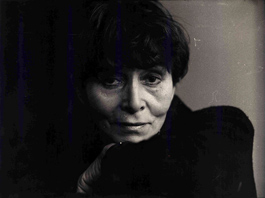
Věra Chytilová was a lifelong rebel of Czech cinema
 |
| Věra Chytilová studied architecture in Brno between 1948-1949. |
Although her post-revolutionary films did not receive the same recognition as her earlier works, they still lived up to her reputation as a critical, philosophical, and provocative author. Chytilová was also famous for her uncompromising nature. "For me, an argument is a form of discussion, and even after the biggest ruckus, I treat the person normally. Like my father. Unlike my mother, who would bring things up even after twenty years, he knew how to punish, and that was the end of it," Chytilová explained her sometimes irritable behavior.
In recent years, this unconventional director, who often collaborated with non-professional actors, focused more on documentary filmmaking. After the critically and audience-wise unsuccessful feature film Expulsion from Paradise (2001), she made documentaries about Adolf Branald, screenwriter and artist Ester Krumbachová, women active in politics (Troublemakers), and about a part of Prague where she lived (Troja - Transformations in Time). She had planned to film the life of Božena Němcová, but she was unable to realize that project.
Věra Chytilová was born on February 2, 1929, in Ostrava. She studied architecture in Brno for two years. During her internship in Prague, where she earned extra money as a model at an exhibition, she caught the attention of screenwriter Jiří Brdečka, who was looking for ladies-in-waiting for the film The Emperor's Baker - The Baker's Emperor. While filming this movie, Chytilová fell in love not only with her first husband, photographer Karel Ludwig, but mainly with film. She subsequently worked as a clapper on Barrandov and then applied to FAMU, where she studied directing from 1957 to 1962.
She already attracted attention with her school films Ceiling and Flea Bag. Her feature debut About Something Else, telling the stories of two women, won the festival prize in Mannheim, Germany. In 1965, she filmed a collection of Hrabal's short stories Pearls at the Bottom (the story Automatic World) with former FAMU classmates (Jiří Menzel, Evald Schorm, Jaromil Jireš, Jan Němec), and the following year she excelled with the famous Daisies, which arose from her collaboration with cinematographer (and her second husband) Jaroslav Kučera and screenwriter Ester Krumbachová.
In the midst of working on the film We Eat the Fruit of the Tree of Paradise in 1968, she was caught by the Soviet occupation; after reworking this film into a metaphor about betrayal, she faced a forced break. It was not until 1976 that she made another film - the bitter comedy Game about Apple, featuring Dagmar Bláhová and Jiří Menzel in the lead roles. The comical story of a fading dandy, Faun's Very Late Afternoon, featuring an excellent performance by Leoš Suchařípa, was also very successful with audiences.
Chytilová chose actor Boleslav Polívka for several films - Calamity, The Jester and the Queen, The Inheritance or Kurvahošigutntag (a loose sequel to the film, recently premiered, which Chytilová did not participate in) and Expulsion from Paradise. She also scrutinized social criticism and dehumanized relationships in the satire Panelstory or How Housing Estates Are Born (1979). An originally poetic comedy that turns into a chilling drama - Hoof Here, Hoof There - was made in 1988 with the Sklep theater. Her last feature film was the bitter comedy Nice Moments Without a Guarantee (2006).
From her second marriage, Chytilová had a daughter and a son - Tereza Kučerová is an artist and actress (e.g., Hoof Here, Hoof There, Prague Five, or Crafty Filip) and Štěpán Kučera is a cinematographer (Return of the Idiot or Traps, Traps, Traps under the directorial guidance of his mother). Štěpán Kučera also stood behind the camera for the documentary Journey, which Jasmina Blaževičová made about Chytilová.
Chytilová was the recipient of numerous awards, including the French Order of Arts and Letters, the Czech Lion for long-term artistic contribution to Czech cinema, and the state medal for Merit.
The English translation is powered by AI tool. Switch to Czech to view the original text source.
0 comments
add comment










